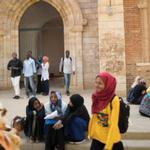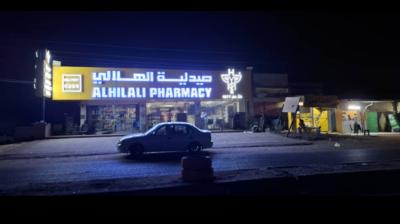Sexual violence in Sudan: From denial to recognition
How to cite this publication:
Samia Nihar (2024). Sexual violence in Sudan: From denial to recognition. Bergen: Chr. Michelsen Institute (Sudan Brief 2024:1)
The April 15 war has led to a shift in the public discourse about sexual violence in Sudan. From being a topic that is largely swept under the carpet, it is now acknowledged as an integral part of warfare. This brief documents the long trajectory of conflict-related sexual violence in Sudan and argues that the current shift might open new avenues for addressing and combatting sexual violence.
Conflict-related sexual violence is increasing in Sudan. According to the head of the Unit to Combat Violence Against Women and Children, the Rapid Support Forces (RSF), which is an offshoot of the notorious Janjaweed Militia, formed in 2003 to quell a rebellion in Darfur against the central government, are behind a wave of sexual violence. Rape (and the fear of being raped) are forcing families to flee from their homes in Khartoum, a hotspot in the current warfare. In Darfur, RSF drawing its soldiers mainly from Arab tribes are targeting women and children of African origin.[1] The UN warns against the continued escalation of sexual violence as a tactic of war and suggests RSF combatants have been at the forefront of these crimes, but there are also reports that soldiers from the Sudanese Armed Forces (SAF) have been implicated.[2] There are reports of sexual exploitation, slavery, trafficking, rape, forced marriage and prostitution and acts that amount to enforced disappearance.[3] UNHCR have expressed concern about the underreported cases of sexual violence, suggesting that only 3% of actual incidents are likely documented.[4] “The alarming accounts of sexual violence that are heard from people who have fled to Port Sudan are just a fraction of those being repeated at a sickening scale from conflict hotspots across the country,” , according to UN representatives in the country.[5] The UN estimates that 4.2 million Sudanese are in need of gender based violence services, which are currently lacking.[6]
Sexual violence as a tool of war
The use of sexual violence as a tool of war has a long trajectory in Sudan. Despite the widespread use of sexual violence in war, and also as a tool of political oppression during former president Omar al-Bashir’s authoritarian regime, sexual violence has been under-reported for various reasons, including a) the fact that the regime was complicit in these crimes b) that it is associated with shame and stigma for the survivors and their families, and c) the lack of protection against sexual violence within the legal frameworks.
Rape has been a part of warfare in many civil wars, but from 2000 onwards, when the United Nations’ landmark resolution on Women, peace and security was issued, more attention was given to conflict related sexual violence internationally. It was the Darfur conflict in 2003 that thoroughly put sexual violence on the agenda in Sudan as women’s right activists and the international community at large managed to bring attention to the systematic use of genocidal sexual violence. Increasingly women have put sexual and gender-based violence on the agenda, including women’s marches and demands for legal reform.[7]
Although the women’s movement has worked consistently to put conflict related sexual violence on the agenda especially in the wake of the Darfur conflict, the gravity and magnitude of these crimes have always been categorically denied, not only by the Bashir regime which used rape to silence women, but also by the military during the revolution and even the transitional period where sexual violence continued to be used as a tool to deter women from protesting.[8]
The lacking impact of the Unit to Combat Violence Against Women and Children (VAW unit) serves as an illustration of the authorities’ reluctance to acknowledge and combat sexual violence. The unit was established by the Sudanese Council of Ministers in November 2011 and was controversial from the very beginning. Then president Omar al-Bashir had been indicted by the International Criminal Court (ICC) for crimes against humanity and war crimes in Darfur, including systematic and widespread sexual violence, and needed to give the impression that he was taking the charges seriously. Women’s rights activists saw the establishment of the VAW unit as the regime’s “attempt to whiten their face so that they could [appear to] take the lead in handling the problem of sexual violence”.[9] Far from being any defender of women and children’s rights, the culture of rape and impunity for such crimes had gained strength during Bashir’s reign. In fact, the unit’s leader at the time had on several occasions denied the fact that there is sexual violence in Sudan.[10]
The most famous example is the case of the village Tabit in North Darfur in 2014 where more than 200 women and girls were gang-raped by SAF.[11] The Bashir regime denied the attacks and prevented an international investigation of the crimes. Sudan’s special prosecutor for crimes in Darfur at the time called the reports of mass rape in the media ‘propaganda’.[12] There was no stated position from the Unit for Combating Violence against Women. The Ministries of Foreign Affairs and Defense responded to the denial of the incident before the international community.
“Sudan’s special prosecutor for crimes in Darfur at the time called the reports of mass rape in the media propaganda.”
From denial to condemnation
Sexual violence in general and rape in particular has traditionally been met with silence and denial by official authorities, and with threats towards women’s groups and human rights organizations working within the field. After the outbreak of the April 15 war, however, official authorities and institutions are acknowledging sexual violence. The VAW unit is now documenting cases of sexual violence[13] and SAF has openly acknowledged that rape is part of current warfare. In his speech to the UN General Assembly in New York in September 2023, general Burhan accused RSF of committing sexual violence against Sudanese women and said: “They have carried out ethnic cleansing and forced displacement, as well as sexual violence and killing based on ethnicity”.[14] The official Sudanese media coverage of sexual violence after the April 15 war is unprecedented and rape is now met with massive condemnation. There are several reasons for this shift.
First, there is plenty of evidence that the RSF have been involved in widespread sexual violence. There is also no doubt that this evidence is being used by SAF to delegitimize its enemy in the ongoing war. Sudan’s ambassador to the United Nations has told the United Nations Security Council that Sudanese forces “are not engaged in any sexual or gender-related violence and the party involved in these atrocities is well known” implicitly referring to the RSF whose violations are documented in several official reports.[15] Burhan has even called for an inquiry into the war crimes committed by RSF,[16] meanwhile ignoring the crimes committed by his own forces during the current and past wars. As mentioned, SAF used rape as a tool of war in Tabit, and there is little evidence to suggest that their approach has changed. High-ranking officers of SAF have been known to be, and we can only still assume are, loyal to Bashir’s Islamist regime which had a poor track record when it comes to sexual and gender-based violence. During and after the Sudanese revolution starting in December 2018, sexual and gender-based violence has continued to be used as a tool in attempts to deter women from participating in political protests and public life in general.[17] If the Sudanese official condemnation of sexual violence is to be an effective one, it needs to encompass all perpetrators and all arenas where incidents have taken, and still are taking, place. Yet, the move where rape is now openly acknowledged as a tool of war in the current conflict might bring about unintended consequences that women can take advantage of in their efforts to bring this important issue to the forefront.
Second, the VAW unit has been professionalized during the transitional period. Although the transitional government headed by Abdallah Hamdok failed to protect women against sexual and gender-based violence beyond some symbolic legal changes, including the criminalization of female genital mutilation (FGM) and the abolition of the notorious public order laws, little progress was made to protect women from sexual and gender-based violence during the short-lived transitional period. Nonetheless, some important changes took place within the VAW unit.
Historically the VAW unit has been headed by Bashir loyalists with an Islamist ideology. During the transitional period, albeit short lived, the unit underwent a process of professionalization whereby the new leader was chosen based on merit and professional competencies. A psychologist and trauma specialist, Sulima Ishaq and her team started documenting rape cases during the transitional period. In fact, the Sovereign council headed by Burhan initiated a lawsuit against her for documenting and reporting on rape cases of pro-democracy protesters following the military coup d’etat which hijacked Sudan’s transition to democracy in October 2021.
This paradigm shifts in the VAW unit’s response to sexual violence and in documenting and reporting cases is a new dynamic. Some interpret this major change as something dictated by a professionalism and claim that the unit is doing an enormously important job in reporting on sexual violence without which we would have even poorer documentation of the use of rape as a tool of war in the current conflict. However, there is also emerging critique that the VAW unit does not document cases implicating SAF. Although we can expect that the majority of cases will involve RSF, based on their track record in Darfur and the fact that RSF are fighting mostly on the ground whereas SAF is mostly bombing from the air, it is nonetheless important to document all cases.
“There is also emerging critique that the VAW unit does not document cases implicating SAF.”
Paving the way for structural transformation
Something has undeniably changed when it comes to the narrative about sexual violence in Sudan. The official discourse is no longer one of denial. The recognition of rape as a tool of war might be a blessing in disguise. At the very least, it opens up the space to put sexual and gender-based violence on the agenda in any upcoming peace and ceasefire processes. If rape is in fact used as a tool of war, then it should be dealt with in future peace agreements. This will allow women’s groups to address sexual and gender-based violence in a more systematic way, from ensuring that the legal framework protects women against such crimes to addressing the patriarchal logic behind it in efforts to bring about structural transformation.
“The official discourse is no longer one of denial.”
About this brief
This brief is an output from the Sudan–Norway Academic Cooperation (SNAC). The programme is funded by the Royal Norwegian Embassy in Khartoum. This brief represents the views of the author and does not necessarily reflect the opinions of the Gender Unit at DSRI.
Endnotes
[1] “Q&A: The civil servant documenting sexual violence in Sudan’s conflict”. The New Humanitarian, 26 June 2023. Available at https://www.thenewhumanitarian.org/interview/2023/06/26/woman-documenting-sexual-violence-Sudan-conflict
[2] Conflict-Related Sexual Violence in Sudan. Insecurity Insight, October 2023. Available at https://insecurityinsight.org/wp-content/uploads/2023/10/Conflict-Related-Sexual-Violence-in-Sudan-October-2023.pdf
[3] “Sudan: UN experts appalled by use of sexual violence as a tool of war”. Reliefweb.int, 30 November 2023. Available at https://reliefweb.int/report/sudan/sudan-un-experts-appalled-use-sexual-violence-tool-war
[4] “Sudan’s Silent Crisis: UN Report Calls for Action on Gender Violence for 4.2 Million”. Morocco World News, 24 December 2023. Available at https://www.moroccoworldnews.com/2023/12/359742/sudan-s-silent-crisis-un-report-calls-for-action-on-gender-violence-for-4-2-million
[5] “Sudanese suffer sexual violence on ‘sickening scale,’ UN says.” Reuters, 10 August 2023. Available at https://www.reuters.com/world/africa/sudanese-suffer-sexual-violence-sickening-scale-un-says-2023-08-09/
[6] Protection Brief - Gender-Based Violence: Sudan Situation (December 2023). Reliefweb, December 2023. Available at https://reliefweb.int/report/sudan/protection-brief-gender-based-violence-sudan-situation-december-2023
[7] “Sudanese Women March for Protection Against Gender Based Violence”. Chr. Michelsen Institute, 2021. Available at https://www.cmi.no/publications/7766-sudanese-women-march-for-protection-against-gender-based-violence
[8] “In Sudan, the price of revolution is paid for by women’s bodies”. The New Arab, 14 January 2022. Available at https://www.newarab.com/opinion/price-sudans-revolution-paid-womens-bodies
[9] Interview with women’s rights activist in 2011 from Liv Tønnessen (2014). “When rape becomes politics: Negotiating Islamic law reform in Sudan” Women’s Studies International Forum 44, pp. 149
[10] Ibid, pp 150
[11] “Mass Rape in North Darfur. Sudanese Army Attacks against Civilians in Tabit”. Human Rights Watch, 11 Februar 2015. Available at https://www.hrw.org/report/2015/02/11/mass-rape-north-darfur/sudanese-army-attacks-against-civilians-tabit
[12] “Sudan denies North Darfur mass rape reports, UN demands access”. Dabanga Radio TV online, 11 September 2014. Available at https://www.dabangasudan.org/en/all-news/article/sudan-denies-north-darfur-mass-rape-reports-un-demands-access
[13] “Q&A: The civil servant documenting sexual violence in Sudan’s conflict”. The New Humanitarian, 26 June 2023. Available at https://www.thenewhumanitarian.org/interview/2023/06/26/woman-documenting-sexual-violence-Sudan-conflict
[14] Sudan’s Al Burhan accuses rival Rapid Support Forces of war crimes in UN speech”. The National News, 21 September 2023. Available at https://www.thenationalnews.com/world/africa/2023/09/21/sudans-al-burhan-accuses-rsf-of-war-crimes-in-speech-to-unga/
روايات مفزعة عن العنف الجنسي في السودان [15] Independent Arabia, 10 August 2023. Available at https://www.independentarabia.com/node/482971/%D8%B3%D9%8A%D8%A7%D8%B3%D8%A9/%D9%85%D8%AA%D8%A7%D8%A8%D8%B9%D8%A7%D8%AA/%D8%B1%D9%88%D8%A7%D9%8A%D8%A7%D8%AA-%D9%85%D9%81%D8%B2%D8%B9%D8%A9-%D8%B9%D9%86-%D8%A7%D9%84%D8%B9%D9%86%D9%81-%D8%A7%D9%84%D8%AC%D9%86%D8%B3%D9%8A-%D9%81%D9%8A-%D8%A7%D9%84%D8%B3%D9%88%D8%AF%D8%A7%D9%86
[16] Calls to address sexual violence in Darfur, El Burhan orders investigation into ‘war crimes’”. Dabanga Radio TV online, 8 July 2023. Available at https://www.dabangasudan.org/en/all-news/article/calls-to-address-sexual-violence-in-darfur-el-burhan-orders-investigation-into-war-crimes
[17] “Sudan files lawsuit against combating sexual violence official over UNITAMS report”. Sudan Tribune, 7 April 2022. Available at https://sudantribune.com/article257484/





